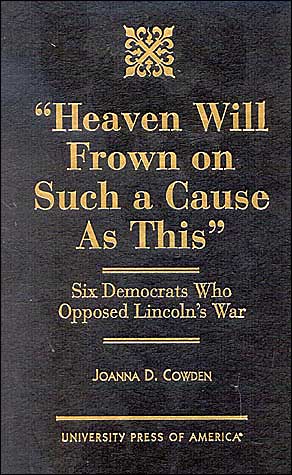

 |

|

The average rating for Heaven will frown on such a cause as this based on 2 reviews is 4 stars.
Review # 1 was written on 2014-05-08 00:00:00 Jason Campbell Jason CampbellThis is a well-written detailed biography of the New York born General James S Wadsworth. This book is largely forgettable because other Generals have had more memorable moments in the War and in later life. Wadsworth's biography is worth reading for those who have ties to New York and Geneseo in particular. Wadsworth's family dates back to the founding of the country, and his family was the first to settle the Geneseo area in New York. He was a businessman with political influence and was granted a commission from Lincoln. Despite being a "Political General", he had few errors on the field of battle rising through the ranks from Brigade to Division command until his death in the Wilderness. This book was not as dry a read as I expected about a little remembered political general, and was more interesting than I expected. His major commands were in the First Corps at Gettysburg and the Fifth Corps in the Wilderness. There was a wealth of information about his early life in Geneseo and his entry into the Civil War, even at his advanced age. The author has done a great job detailing Wadsworth's life while not putting you to sleep. The author provides a nicely balanced and fair biography of a "Political General" who showed skill commanding men and bravery in combat leading his men from the front lines. As a New Yorker, I found this a very interesting worthwhile read for New Yorkers in the Civil War! |
Review # 2 was written on 2014-07-06 00:00:00 Thomas Ruzicka ��. Thomas Ruzicka ��.Laurel Ulrich’s The Age of Homespun: Objects and Stories in the Creation of An American Myth analyzes the “female economy.” The historiography of early New England traditionally put women outside of market activity until the Revolutionary era. Ulrich responds to earlier views by arguing that long before the Revolution rural New England families, specifically women, began to grapple with a changing market economy. Ulrich uses objects, primarily textiles, to shed light on women’s lives and, perhaps more importantly, highlight their work as important not only to their families but central to the greater New England and Atlantic economies. |
CAN'T FIND WHAT YOU'RE LOOKING FOR? CLICK HERE!!!